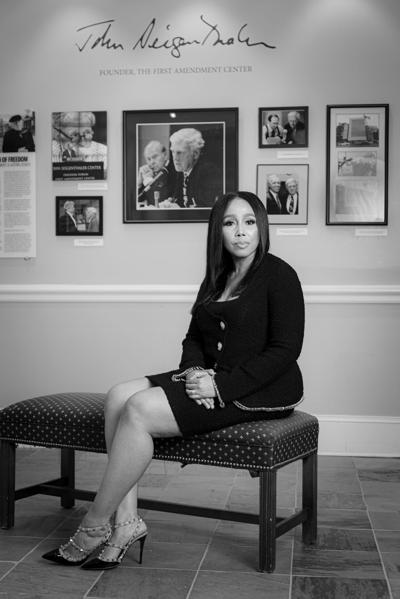
Dr. Tameka Winston’s biography is full of accolades. She holds a Ph.D. in education from Tennessee State University, where she now serves as chair of the communications department and professor of communications. She’s been the recipient of several honors, including TSU’s Woman of Legend and Merit Award and the 2017 Nashville ATHENA Award, which is presented annually to an exceptional female leader. She is the only faculty member to receive the Professor of the Year Award in TSU’s College of Liberal Arts twice. She is a consultant to the University of Delta, Agbor, in Nigeria as that school’s faculty builds its communications program, and she collects books to send to the Agbor community each year. By all accounts, Winston is an influential Nashvillian.
But when we meet at the John Seigenthaler Center on Vanderbilt University’s campus, she’s more eager to talk about her humble beginnings. Winston grew up in a small shotgun house in Belzoni, Miss. Neither of her grandfathers could read or write, and her grandmother pushed her to go to college and excel.
She wanted to meet in the building named for the legendary Tennessean editor and journalist because it was the reason she first visited Nashville in 1999. As a junior at Alcorn State University in Mississippi, Winston was selected for the Chips Quinn Scholars Program for Diversity in Journalism, a paid internship created by the USA Todayfounding editor and longtime Gannett company president John C. Quinn to give college students of color newsroom experience. It was — and still is — a program of the Freedom Forum in Washington, D.C. The institute flew Winston and her cohort to Washington for specialized training in broadcast or print journalism, and then they were off to their assignments.
But her first assignment at a Mississippi daily didn’t work out. It was the early days of email, and Winston’s fellow Chips Quinn intern sent a jokey forward to the production printer instead of the printer next to his desk. She rushed to retrieve it, and they were both fired on the spot. But John Quinn called her personally to make it right: Would she like to intern in Nashville at the First Amendment Center?
Seigenthaler founded the First Amendment Center with offices in Washington and Nashville in 1991 to “help promote appreciation and understanding of the values on which the United States was built.” (After Seigenthaler’s death in 2014, Vanderbilt named the center after him.) Winston didn’t have a car or any money, but Quinn assured her that she could stay in Vanderbilt Village for no charge and walk right over to work each day. That’s what she did.
“Mr. Seigenthaler’s team took care of me,” Winston says. They took her grocery shopping and to the mall. They drove her to assignments. Seigenthaler was at the D.C. office and would come to Nashville every couple of months, and he always met with the interns to discuss their work. “I’ll never forget that type of kindness,” she says.
Quinn kept in touch with Winston for the rest of his life, as he did with many of his interns. She’d receive his handwritten letters full of advice and encouragement. Before she joined the faculty at TSU, she gave teaching middle school a try. She was struggling with this path when she received one such letter from Quinn with a message: “Remember, you were once that age.”
She brings this spirit to her work at TSU and especially in her interactions with her own protégés. She founded the Black Docs Mentoring program, through which she mentors scholars of color pursuing doctoral degrees across the country. Her Sirius XM radio show Black Docs — on hiatus but due to resume in the fall — invites five Black female doctors who are experts in various fields to discuss their lives and work.
Winston authors textbooks in communication studies. While this might not sound glamorous on its face, she sees it as a way to help Black students see themselves reflected in their studies. “What I saw in undergrad, for me, wasn’t a direct reflection of African American work,” she says. “And I wanted that to be included — our history as well.”
Quinn had a saying he’d repeat to his protégés about racism, especially during their training sessions as college students. Winston remembers it today. “You’re going to continue to soar. Don’t let the bastards get you down.”
Our profiles of some of Nashville’s most interesting people, from a sought-after local actor to a wrestling legend, a former Miss Tennessee and more






